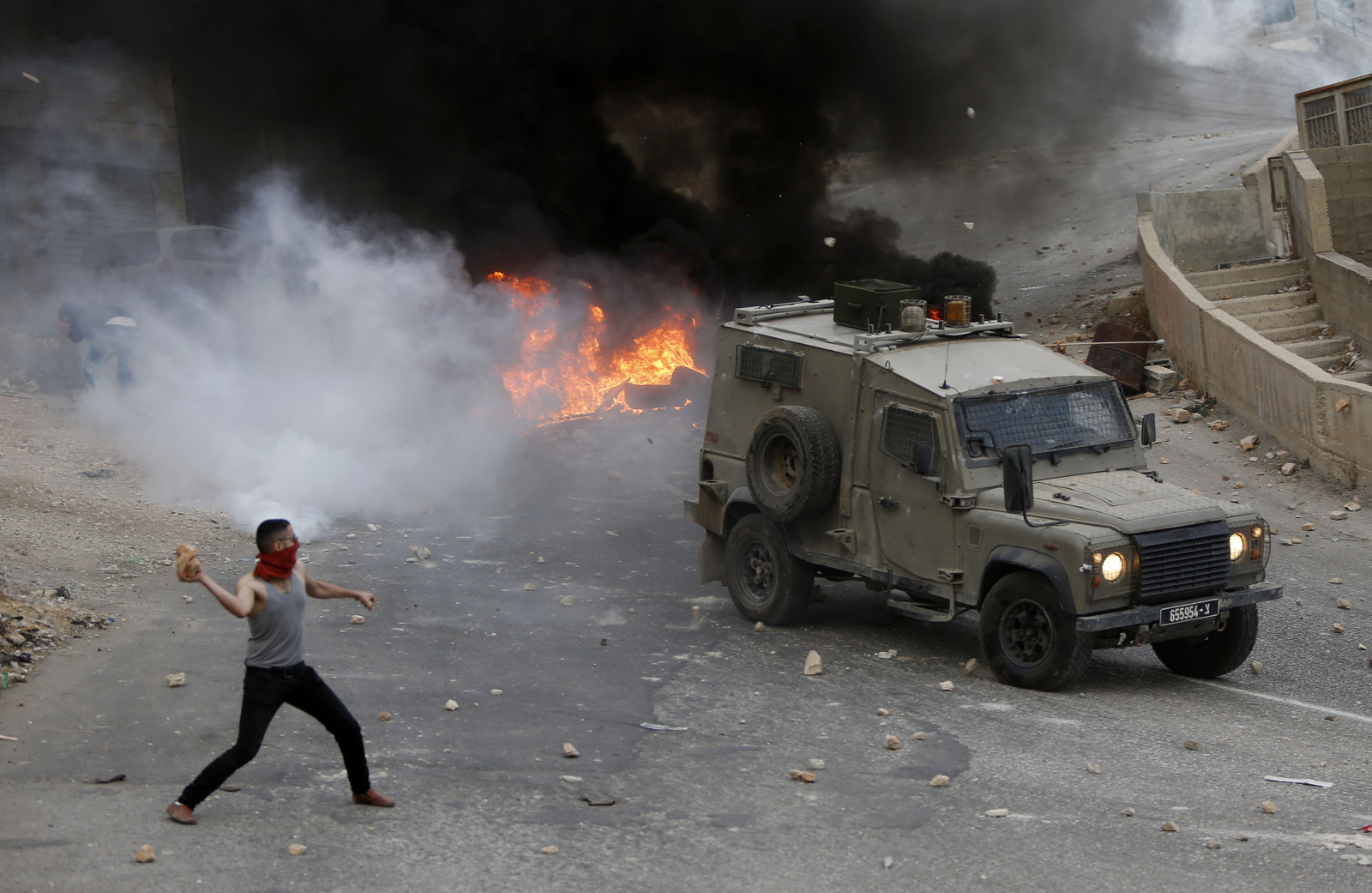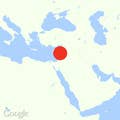
JERUSALEM — Amir Mizrahi hasn’t held a gun in eight years, but this week he stood outside the L.H.B. gun store in downtown Jerusalem cradling a brand-new 9mm Glock.
“If someone comes near me or my kids I’m shooting to kill,” said Mizrahi, a 42-year-old father of four who lives in Jerusalem’s Rehavia neighborhood. “Enough is enough. We each have to defend ourselves.”
Less than an hour later, Ahmed Abu Jameel emerged from the same store with a small canister of pepper spray. The Palestinian father of six said it was the only weapon he could legally buy (and afford) at the store.
“These days people think every Arab is a terrorist. I’m scared of the Jews who hear my accent and want to take revenge, and I’m scared of Palestinians thinking I’m a Jew and stabbing me in the back,” said Abu Jameel. With light hair and a light complexion, he often gets mistaken for a Jewish resident of Jerusalem. “Who is going to protect me?”
As Israelis and Palestinians watch the latest round of violence, people from both sides have increasingly expressed a lack of confidence in their political leadership to lead, and in their security establishment to make their lives more secure. In the month since clashes in Jerusalem began, nine Israelis have been killed in stabbings that ranged from the central Israeli cities of Tel Aviv and Ra’anana, to the southern city of Be’er Sheva and the northern city of Afula. Forty-one Palestinians have been killed, including 20 identified by Israel as attackers — the rest killed by Israeli soldiers while taking part in protests that have spread across the Palestinian cities of Hebron and Jenin to the Gaza Strip. Few, however, see a guiding hand to the violence, pointing instead to individuals whose unpredictable and often opportunistic stabbing and shootings have been labeled “lone wolf attacks” by Israeli officials.
Israel has no “quick fix against lone wolf attacks,” police spokesman Micky Rosenfeld told journalists at the scene of a stabbing in front of Damascus Gate in Jerusalem last week.
Like many other attacks that have taken place in Jerusalem in recent weeks, the incident was caught on film. One minute, Mohammed Ali is sitting on a low wall, just outside the entrance to Damascus gate, chatting to another man and ignoring the Israeli border police nearby. The next, as the police approach Ali and ask for his documents, he springs up and pulls a knife from the waistband of his jeans — he was shot dead almost instantly. Like many other attacks, various militant groups claimed responsibility after the fact. His family told the Guardian that he was “happy and popular,” and that he was not particularly political aside from being angry at recent events in Jerusalem.
In Ramallah, 20-year-old Imad Fahrooz, said he felt “complete solidarity” with those carrying out the attacks.
“I understand them. You live your whole life under occupation and you know you have no hope in anyone that things will get better. They only get worse and worse. So what do you do? Do you wait for Abbas to declare an intifada? You’ll die waiting,” said Fahrooz, who said he had taken part in protests last week near the checkpoints that separate the West Bank city of Ramallah from the nearby city of Jerusalem. “The men of Palestine are taking matters into their own hands. We won’t wait for the leadership, they can catch up to us.”
While both Hamas and Fatah have called on their Palestinian supporters to take part in protests, few have answered that call, with a planned day of rage in the West Bank last Friday failing to garner more than a few hundred supporters in Ramallah. Israelis, meanwhile, have increasingly voiced support for longstanding vigilante groups who patrol the streets of Jerusalem following attacks hunting for anyone of Palestinian origin and calling for revenge.
Last week, a 36-year-old Jewish man in the city of Haifa stabbed Israeli citizen Uri Rezken, when he believed him to be Palestinian. Israeli police have not named the 36-year-old attacker out of fear he himself could be targeted in a reciprocal attack. Just a few days earlier, a 17-year-old from the southern city of Dimona stabbed four Arab citizens, while in the coastal city of Netanya a group of Jewish men attacked and beat a local Palestinian man in a revenge attack.
On Monday morning, an Eritrean asylum seeker, who was mistaken for an assailant in the southern Israeli city of Beersheva, died of wounds he sustained when he was shot by a police officer at the scene of a stabbing attack. He was then beaten by a mob that had gathered. One of the men, who was caught on film kicking the Eritrean man in the head while he lay bleeding on the ground, told Israel’s army radio Monday that “in a moment of fear, and because of the pressure, you do things you’re not even aware of.”
“All the people gathering around the man attacked him. Nobody was helping him. People just were making sure he doesn’t move. There is no human being who did not kick or beat him. Everyone took part,” said the man, who was only identified by his first name, Dudu. “I couldn’t sleep last night thinking about what happened and I feel sick about myself.”

In Jerusalem, Amir Mizrahi said he had “never imagined” himself buying a gun years after he left behind his security job, which mandated that he carry a pistol at all times.
“I was not naïve, I knew that we still had problems and that we would see more wars, but I didn’t think there would be these kinds of fights in the streets of Jerusalem again,” said Mizrahi, who added that he had been visiting a friend in the East Jerusalem neighborhood of Pisgat Ze’ev when a stabbing there injured two people last week. “I could have been out on that street, and that knife could have been in my back. What is Israel going to do? Put a soldier on ever corner?”
Over the last week, Israeli Prime Minister Benjamin Netanyahu has ordered a massive military deployment across Israeli cities as well as increased police patrols. The city of Jerusalem has erected semi-permanent concrete barriers along the seam line separating many Palestinian east Jerusalem neighborhoods from Jewish areas. Still, many Israelis have said the protection is too little too late — a poll by Israel’s Channel Two news last week showed that Israelis felt that hardline politicians Avigdor Lieberman and Naftali Bennet were better suited to protect Israel over those of current prime minister Netanyahu.
“We keep voting for Netanyahu because he says he will protect us. And yet Jews keep dying on the streets of our homeland,” said Yoni Ephraim, a 27-year-old student who lives in Jerusalem.
Last week, Ephraim said he was passing by as participants at a rally held by the extremist group Lehava in downtown Jerusalem chanted “Death to Arabs.”
“I didn’t join in, but I have to say that I understood them,” said Ephraim. “I think more people understand them, and more people appreciate when [Jerusalem Mayor Nir] Barkat tells people to take matters into their own hands.”
Last week, Barkat publically encouraged residents to carry arms if they have a military or security-forces background.
“I don’t know of one negative incident of guns with people who have a license,” said Barkat. “There’s only positive experience in our country.”
Earlier this month, in response to the spate of attacks, Internal Security Minister Gilad Erdan approved easing restrictions so that officers with the rank of first lieutenant or higher, as well as former and current members of special operations units serving in regular or reserve duty, could obtain guns. L.H.B. told the Haaretz paper that they had seen a 30% increase in sales, and sold out of other defensive tools like pepper spray or clubs.
“If the third intifada is coming, I think people just want to be prepared to defend themselves,” said Ephraim.
In Jerusalem, Abu Jameel said it was too early to say whether the violence of the last month was the beginning of the next intifada, or uprising; the second intifada, which started in September 2000, never officially had an end date.
“Let’s wait until enough Palestinians say it is an intifada for themselves and then we will know it is the intifada and can say that without a question mark attached,” said Abu Jameel. “In either case, this is not like what is happening before. There is no rules, there is no organization. This is not army versus army or even army versus terrorists, this is man versus man.”


